This post may contain paid links to my personal recommendations that help to support the site!
You might already be thinking of getting the Python for Everybody course but a question still lingers: is the Coursera Python for Everybody Specialization actually worth it?
I’ve done some digging and found a simple answer:
The Coursera Python for Everybody Specialization is worth it. Designed for complete beginners, Coursera Python for Everybody by the University of Michigan is worth getting for its 82 hours of beginner-friendly content, wide coverage of Python and data science skills, and capstone project, for only USD $49/month.
You might be wondering now: how is it worth it?
Well, I’ve put together 5 reasons why it’s worth it!
Coursera Python for Everybody Review: 5 Reasons To Get It
Read on for more information!
1. It Guides You Through A Capstone Project

If you’re going to be taking the Python for Everybody Specialization on Coursera, you’ll be guided through a capstone project at the end of the course.
More than just introduce fundamental programming concepts, a capstone project helps to solidify your learning.
Having project-based learning is crucial for authentic learning!
Here’s why this capstone project from the specialization will help you:
- Gives you hands-on practice, which develops muscle memory
- Prepares you for real-life examples of application
- Provides you with the confidence to handle practical tasks beyond the ‘textbook’ content
According to research from the Lucas Education Research, including the University of Michigan (which offers this online course), having project-based learning approaches can produce better student outcomes!
Based on my own personal experience, I’m a strong believer in doing projects when learning new skills.
When I first started learning Python, I created a project with a few friends. This really helped me in solidifying my skills in programming!
That’s why if you’re planning to learn Python for the first time through this specialization, the capstone project is a great addition to your learning.
Want to start learning Python but have a biology background?
You’ll want to read these 15 things about Python and biology first!
2. It’s An Accompanying Course to a Textbook
Another great reason why the specialization is worth it is that it’s associated with the Python for Everybody Website (PY4E).
This site has all the free tools, resources and courses related to the Python for Everybody curriculum, including a free textbook!
This is another great reason to take the specialization!
Here’s why:
Having a textbook as a supplementary resource alongside any online course is one of the best ways to learn fast.
You’ll get to refer to any notes or in-depth content on your book if you happen to stumble across a bug in your code or an error you’re working on while doing the online specialization.
However, I’m a personal fan of having the Python for Everybody physical book instead of digital copies here.
Check out the following few reasons to find out why:
- A physical guidebook can be referred to without having 2 computer screens
- A physical book is easier to browse across topics and refer to on an ad-hoc basis
- A physical book is a reminder to learn
Since you’ll be referring to all the content in the book as a reference guide while learning, it’s nice to have something in your hands to flip through.
Although the free ebook is great for saving money, it’s not something that you’re likely going to refer to when you’re stuck on some Python code errors, trust me.
To fully maximize your learning experience with learning the Python programming language, I’d recommend getting both the book and the specialization, but only if you can afford it!
With both their physical Python for Everybody physical book and the Python for Everybody Specialization Online course, you’ll pick up Python really quickly without missing out on all the foundations!
3. Provides a Flexible Learning Schedule
If you’re considering the Python for Everybody course, you should know that it’s hosted on one of the most popular online learning platforms, Coursera.
This opens up possibilities for great flexibility for your learning with their premium content!
To give you a better idea of the amount of content you’ll get from the specialization, check out this summary table below:
| Course Number | Course Title | Approx. Hours of Learning Content | Hours of Video Content |
|---|---|---|---|
| 1 | Programming for Everybody (Getting Started with Python) | 19 hours | 5 hours, 27 minutes |
| 2 | Python Data Structures | 19 hours | 5 hours, 16 minutes |
| 3 | Using Python to Access Web Data | 19 hours | 5 hours, 48 minutes |
| 4 | Using Databases with Python | 15 hours | 5 hours, 43 minutes |
| 5 | Capstone: Retrieving, Processing, and Visualizing Data with Python | 10 hours | 3 hours, 23 minutes |
| Total | 82 hours | 25 hours, 37 minutes |
As you can see from the table, you’ll be getting around 30% of your content on video from this specialization.
Coursera hosts all these video lectures on their platform and they’re really great for learning on a flexible schedule since you’re able to pause and continue where you left off!
Check out this screenshot below of what the video interface looks like when you start the specialization:
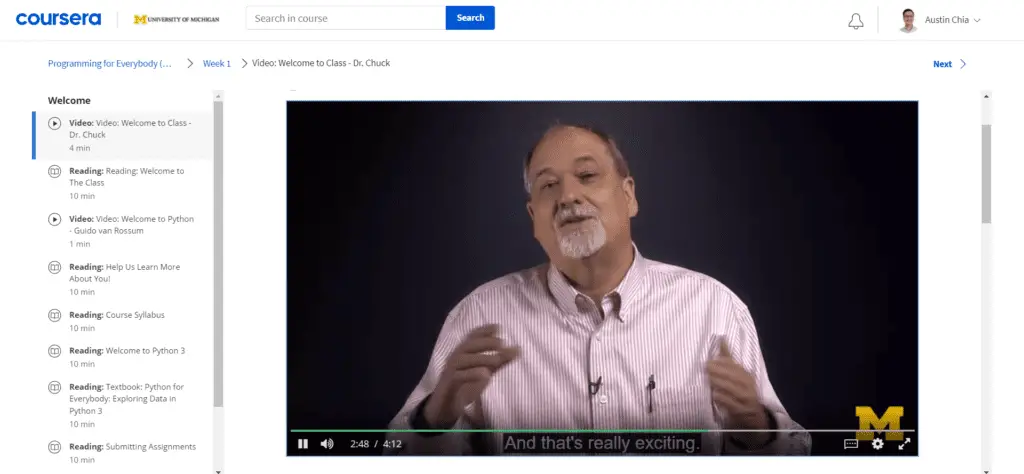
Here’s why I love the Coursera interface when there are video lectures for learning: adjusting the playback speed!
When you get stuck on a concept and require some more time to go back to videos covering that concept, you’ll likely need to slow it down to grasp more information.
In certain simpler concepts, you’ll also get to speed the videos up to cover content faster.
This means you’ll be given the control to go according to your Python learning pace!
Want to know if this flexibility is for you?
There are 2 possible groups of people who would benefit much from this flexible specialization:
- College students
- Workers with 9-5 day jobs
College students: If you’re a college student, you can go through the courses in the specialization in between your classes. This gives you better flexibility over a physical BootCamp or Python class.
Workers with 9-5 day jobs: The added flexibility of having video lectures that you can pause and get back to is perfect for you if you’re holding a 9-5 job.
You won’t have to take any time off just to learn, you’ll only need to watch the lectures on your commute home or after 5 pm.
That’s why having a flexible program by the Coursera Python for Everybody course can help!
4. Covers Essential Data Science Tools Beyond Python

If you’re picking up Python as your first language from the Python for Everybody Course, chances are, you’re thinking of picking up some data science skills.
Although Python is the most frequently used language in data science, you’ll eventually need to know how to use some other common tools in data science.
Coding is actually really commonly used in data science, that’s why you’ll need a well-rounded foundation.
That’s where the Python for Everybody course really delivers beyond just Python!
In this course, you’ll be learning the following tools:
- Atom text editor (for Python)
- SQL
- SQLite3 API
- D3.js library
Atom: Atom is a text editor for coding many languages, including Python. It’s great for learning Python development and web scraping data.
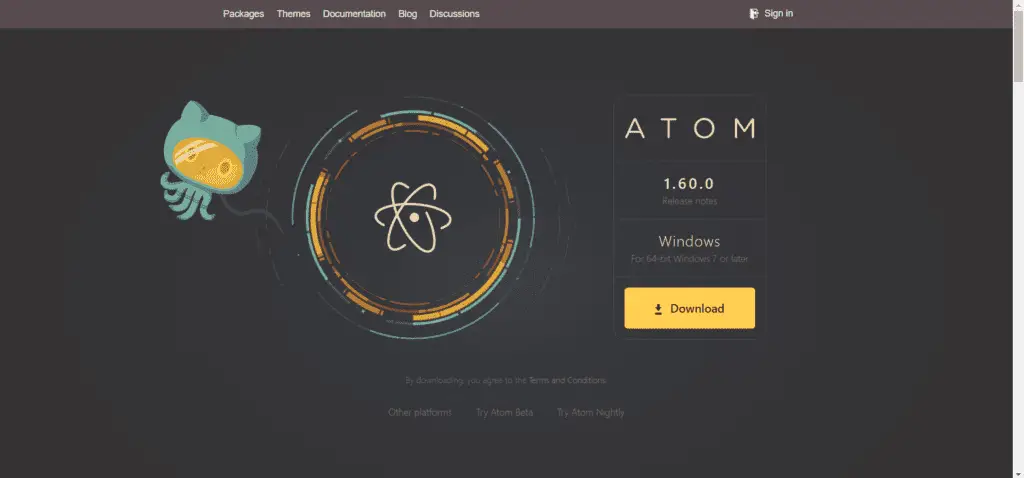
SQL: SQL (Structured Query Language) is a database query language that is commonly used in data science to extract, join and transform data. Data analysis skills using SQL is absolutely crucial for becoming a data analyst.
SQLite3: SQLite3 is an Application Programming Interface (API) that allows you to write SQL code within Python code. It is commonly used in data science and analytics.
D3.js: D3.js is a Javascript library that is commonly used to create data visualizations. It is used for its customizability.
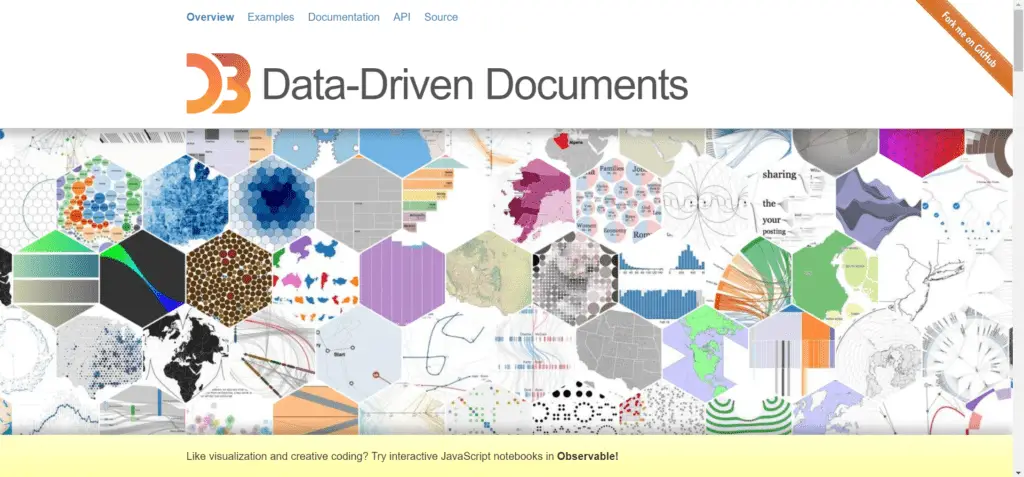
For a specialization course that’s meant for beginners, the Python for Everybody course is really worth it for all the skills and tools you’ll learn!
Here’s a list of skills you’ll learn:
- Basic Python programming
- Reading/writing data from files
- Web scraping using APIs
- Managing databases using CRUD operations
- Basic data visualization
These are all really great skills to know if you’re looking to get into data science !
Based on my own experience, I had to learn some of these things while on the job as a data analyst.
Therefore, by going through the Python for Everybody Specialization, I’m quite certain that you’ll be confident in your skills in Python and more!
In fact, according to Coursera, 11% of learners started a new career after completing the Python for Everybody specialization!

Are you thinking of which to learn – R or Python?
You should read this guide on why Python is used more than R in data science first!
5. Beginner-Friendly
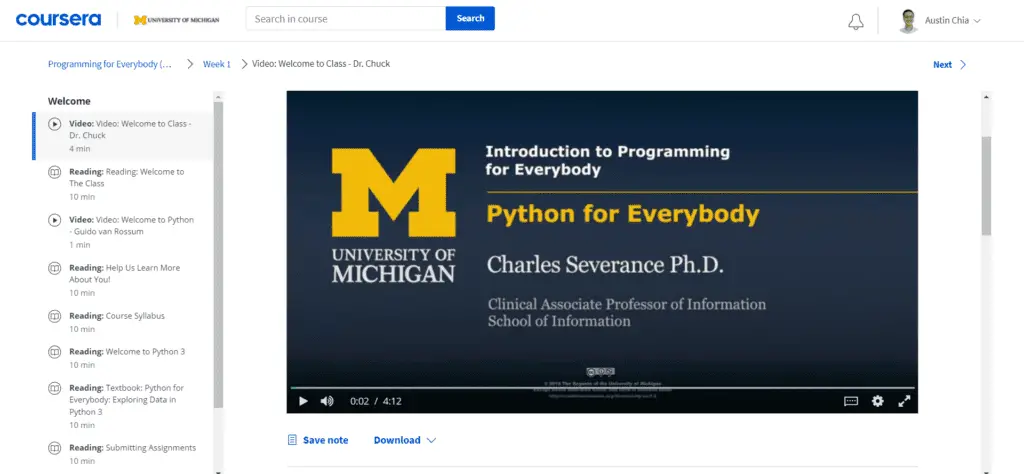
If you’re a beginner, then Python for Everybody is the course for you!
Made for beginners, the course was created for anyone to start learning without any programming experience!
The Python for Everybody Specialization uses many various types of content to keep you engaged and learning Python properly.
Check out the full list of content types below:
- Graded External Tool Assignments
- Readings
- Video Interviews on Python
- Practice Peer-graded Assignments
- Worked Examples
- Practice Exercises
- Quizzes
- Bonus Fun Videos
Here’s a screenshot of the “Python Playground” interface of the graded external tool assignments, where I got to use Python:
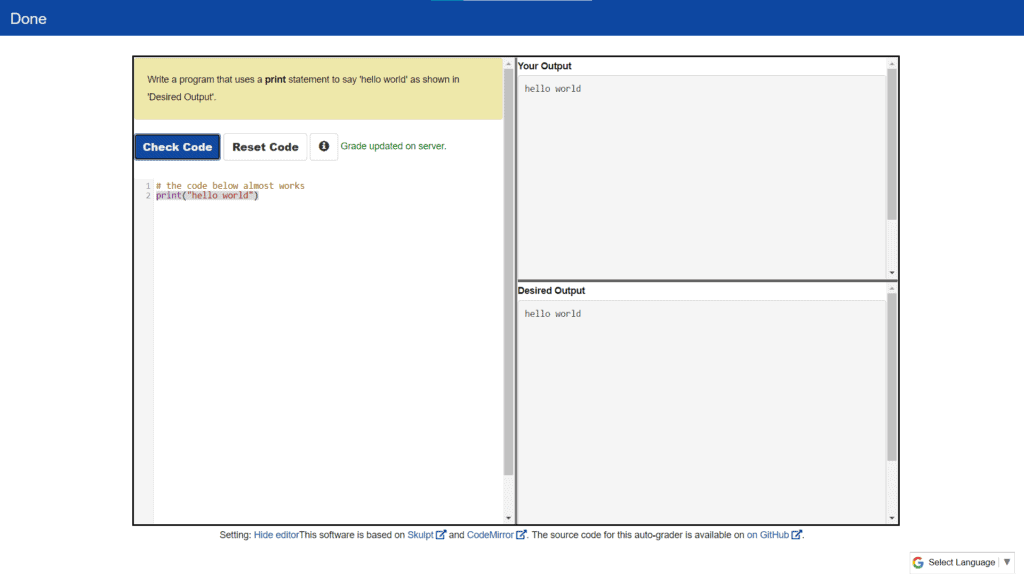
As you can see, you’ll be practising Python programming within an interface that’s hosted directly on your web browser.
I found this really useful since I didn’t have to set up Python on my computer just to start learning how to code!
That’s one of the reasons why the Python for Everybody Specialization is so beginner-friendly.
However, this is only for the first 2 courses.
They still do recommend you move over to installing Python on your machine for better learning after a few exercises.
Here’s another reason why the course is perfect for beginners – fun and engaging videos!
Here’s a bonus fun video where the textbook author showcased an event:
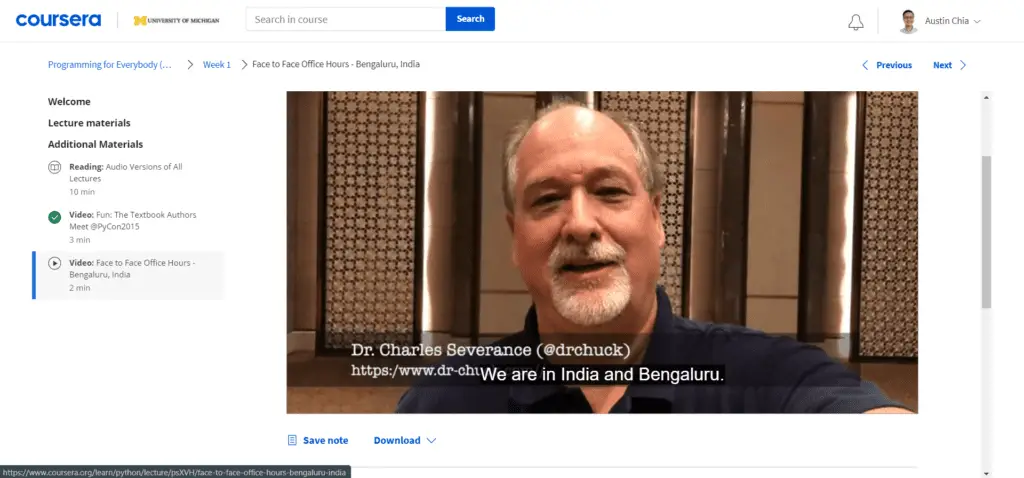
And another video with an interview about the early years of Python:
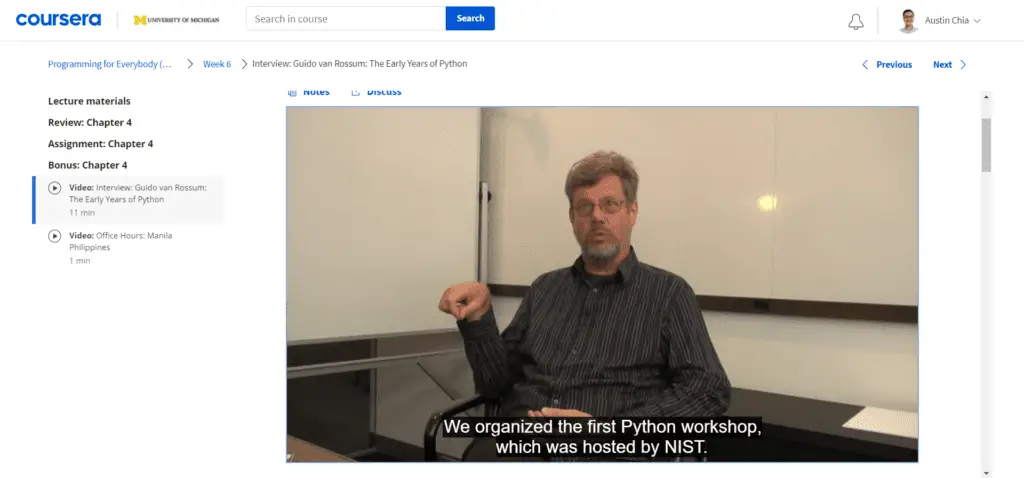
Such bonus videos like these are great for beginners like you!
Here’s why:
These fun videos inspire learners to get going with their learning and also to expand their minds about the world of Python.
That’s why I’d highly recommend ALL BEGINNERS to come take the Python for Everybody Specialization course because it’s so worth it!
Related Questions
How Long Does It Take To Complete the Python for Everybody Coursera Specialization?
It takes 3 months to complete the Python for Everybody Coursera Specialization. This will vary depending on having previous Python experience, personal learning speeds, and hours committed per day. Although the Specialization suggests an 8-month completion time, most will finish the program earlier in 3 months.
With a total of about 82 hours of content to go through, you should expect to only finish the entire Python for Everybody specialization in 3 months.
This should set you at a good learning pace of about 5-7 hours per week.
Of course, you could go slower and follow their recommended timeline of 8 months, but that might cost you more!
Read on for more information on the cost below!
How Much Does the Python for Everybody Coursera Specialization Cost?
The Coursera Python for Everybody Specialization costs USD $147. The specialization is priced using a monthly subscription model of $49/month. Since the program can be completed within 3 months, the total cost of the course is $147. Although Coursera suggests an 8-month completion time, most complete it much earlier.
If you’re considering the cost of the Python for Everybody specialization, do check out the table below for cost estimates:
| Completion Time | Total Cost |
|---|---|
| 1 month | $49 |
| 2 months | $98 |
| 3 months (best-estimated completion time) | $147 (best cost estimate) |
| 4 months | $196 |
| 5 months | $245 |
| 6 months | $294 |
| 7 months | $273 |
| 8 months | $312 |
Since the specialization course is calculated using monthly pricing at $49/month and the course takes 3 months to complete, you’ll likely be paying only $147 in total.
However, if you’re unable to pay for the specialization, there’s another method.
You can apply for financial aid on Coursera!
Coursera can sponsor the specialization for you and fully pay for the course on your behalf if they deem your application valid.
Alternatively, you can consider auditing the course.
This means that you’ll be given access to all the materials in the Python for Everybody Specialization but won’t be awarded the Specialization certificate upon completion.
I’d still recommend getting the specialization for only USD $147 since it’s way cheaper than most physical college classes or boot camps out there!
I personally paid for a Coursera Plus Subscription. This covers many courses, specializations and certificates in Coursera.
There are 2 ways to pay for Coursera Plus:
- Monthly subscription at $49/month
- Annual subscription at $399/year ($33/month)
This is really great value for money if you’re intending to use Coursera to learn multiple skills through courses!
Here’s a screenshot of my annual subscription:
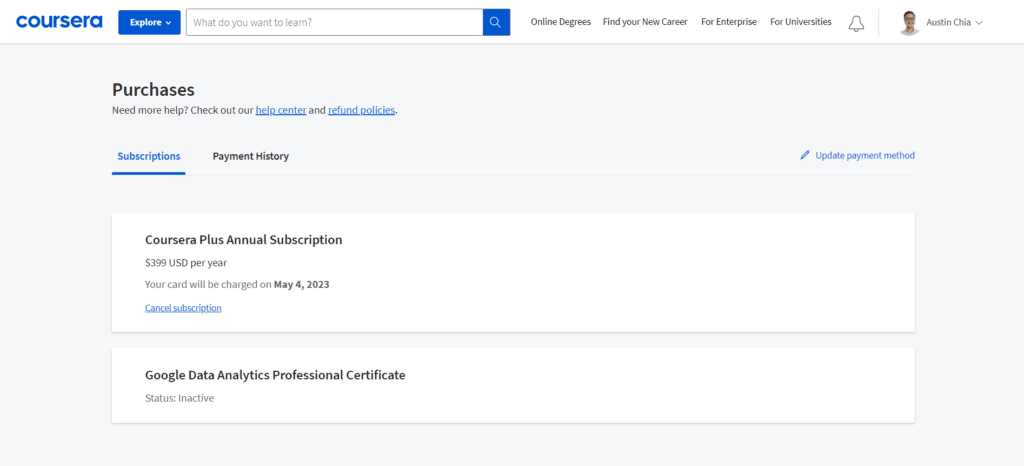
I went for the Annual Coursera Plus Subscription since I’m an avid learner and I believe in long-term learning with a premium online course provider like Coursera.
Do consider that if you’re planning to do the same!
What Should I Learn After the Python for Everybody Coursera Specialization?
SQL, R and Tableau should be learned after completing the Python for Everybody Coursera Specialization. These skills are essential tools used in data science across many companies. The Google Data Analytics Professional Certificate is a good next step after completing the Python for Everybody Coursera Specialization.
There’s so much more to learn other than Python and if you’re aspiring to be a data scientist or data analyst, you might want to consider learning these tools:
Although you’ve learned a little of SQL in the Python for Everybody Specialization, it’s better to learn in the context of applications!
Here are my recommendations:
If you’re thinking of exploring the other skills of data science/analytics after learning Python, I’d recommend taking the Google Data Analytics Professional Certificate to cover all these skills!
However, if you’re thinking of furthering your knowledge in Python with more advanced content, you can consider these:
- IBM Data Analyst Professional Certificate (for Data Analyst career)
- IBM Data Science Professional Certificate (for Data Scientist career)
- IBM Data Engineering Professional Certificate (for Data Engineer career)
I’ve done a comparison of the Google vs IBM professional certificates and if you’re curious to know more, do check it out!
Is Python for Everybody Free on Coursera?
The Python for Everybody Specialization on Coursera is not free. The specialization costs USD $49/month after a 7-day free trial. However, the Python for Everybody course can be audited for free, which does not come with a completion certificate. Additionally, financial aid is also offered to those who are applicable.
Unfortunately, with such a specialization containing premium learning content, it is not free.
Most great content online usually comes with a cost and that makes its quality much better.
Although you’ll get a 7-day free trial before any payment, that’s way too short to learn enough about Python.
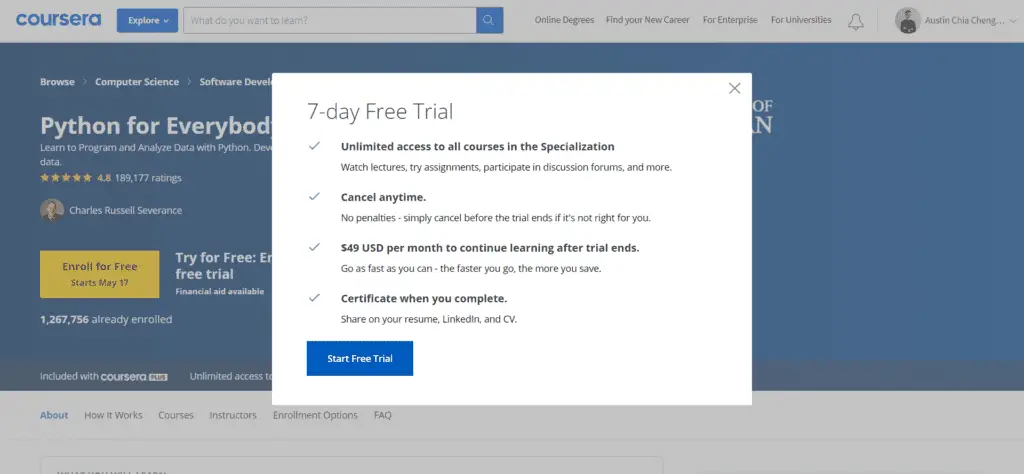
However here are 2 ways you can get it for free:
To audit the individual courses in the specialization, try this:
- Go to each individual course page within the specialization
- Click “enroll for free“
- Click “audit this course“.
However, if you’re auditing the course, you won’t be getting any certificates!
Want to know more about how useful data analytics certificates are?
Check out this other article I wrote, to find out if these certificates are worth it.
Curious about how useful the financial aid is?
Here’s a Quora thread where a user did the course for free using financial aid!
Is Programming for Everybody Coursera Free?
The Programming for Everybody Course on Coursera is not free. The course is part of the Python for Everybody Specialization, which costs USD $49/month after a 7-day free trial. However, auditing the course without a certificate is free. Additionally, financial aid for learners is also possible for valid applicants.
The course is $49 USD /month, which comes after a 7-day free trial.
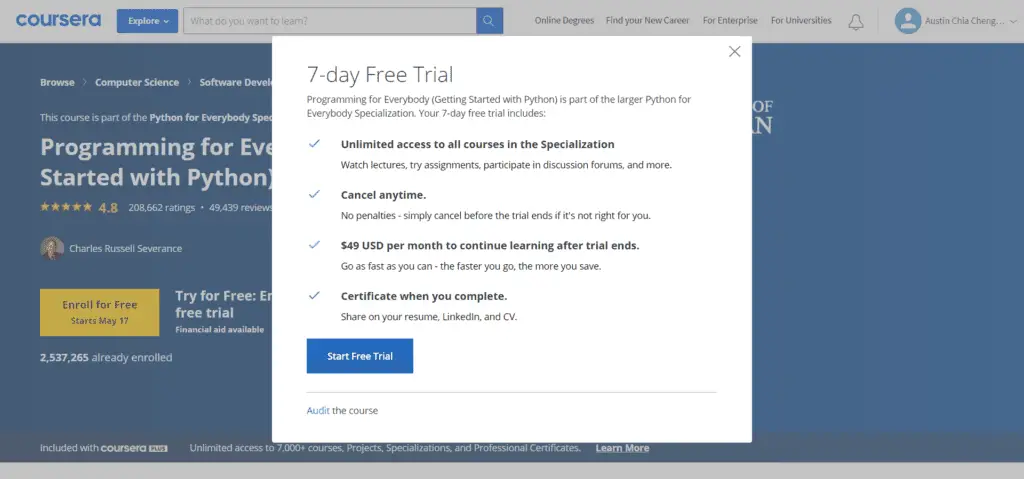
You can choose to audit the course for free as well.
To audit the course, try this:
- Go to the course page
- Click “enroll for free“
- Click “audit this course“.
Final Thoughts
Alright, so that’s all I have to share about the Python for Everybody Specialization by the University of Michigan on Coursera.
If this has been useful and you’d like to support the site, do use my affiliate link to purchase at no extra cost to you.
Thanks for reading!
Looking for more advanced programming courses? Check out these below.
Some Professional Certificates You Might Like:
- Google IT Support Professional Certificate
- Google IT Automation with Python Professional Certificate
- Google Data Analytics Professional Certificate
- Google Digital Marketing & E-commerce Professional Certificate
- IBM Data Analyst Professional Certificate
- IBM Data Science Professional Certificate
- IBM Data Engineering Professional Certificate
- Meta Marketing Analytics Professional Certificate
My Favorite Learning Resources:
My Recommended Learning Platforms!
| Learning Platform | What’s Good About the Platform? | |
|---|---|---|
| 1 | Coursera | Certificates are offered by popular learning institutes and companies like Google & IBM |
| 2 | DataCamp | Comes with an integrated coding platform, great for beginners! |
| 3 | Pluralsight | Strong focus on data skills, taught by industry experts |
| 4 | Stratascratch | Learn faster by doing real interview coding practices for data science |
| 5 | Udacity | High-quality, comprehensive courses |
My Recommended Online Courses + Books!
| Topic | Online Courses | Books | |
|---|---|---|---|
| 1 | Data Analytics | Google Data Analytics Professional Certificate | – |
| 2 | Data Science | IBM Data Science Professional Certificate | – |
| 3 | Excel | Excel Skills for Business Specialization | – |
| 4 | Python | Python for Everybody Specialization | Python for Data Analysis |
| 5 | SQL | Introduction to SQL | SQL: The Ultimate Beginners Guide: Learn SQL Today |
| 6 | Tableau | Data Visualization with Tableau | Practical Tableau |
| 7 | Power BI | Getting Started with Power BI Desktop | Beginning Microsoft Power BI |
| 8 | R Programming | Data Science: Foundations using R Specialization | Learning R |
| 9 | Data Visualization | – | Big Book of Dashboards |

